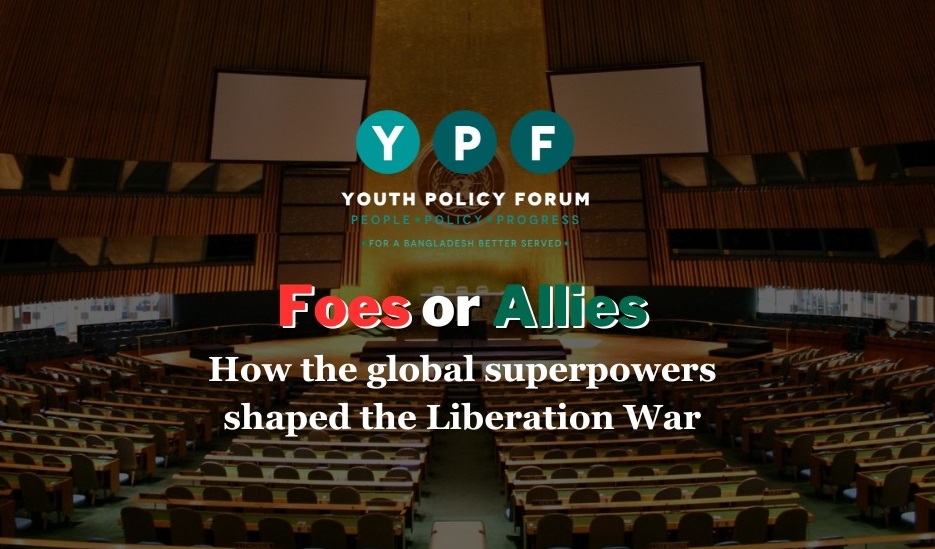“This may be my last message, from today Bangladesh is independent, I call upon the people of Bangladesh wherever you might be and with whatever you have, to resist the army of occupation to the last. Your fight must go on until the last soldier of the Pakistan occupation army is expelled from the soul of Bangladesh and final victory is achieved.” – Bangabandhu Sheikh Mujibur Rahman on March 26, 1971.
This was the declaration of independence which later shaped the history of Bangladesh and gave birth to an independent nation. Different international media reacted to this declaration in different ways according to their national agenda.
Response of West Pakistan:
Although West Pakistan claims that they arrested Sheikh Mujib for leading a nationalist movement and causing chaos, Sheikh Mujib was bound to get arrested prior to declaring independence. Because of a lack of communication back then, the declaration was known to the West Pakistan government on March 27, 1971.
The President of Pakistan, Yahya Khan, broadcasted to the whole nation and called Sheikh Mujib “a traitor”. He said, “This crime will not go unpunished. I will not allow this power hungry and unpatriotic despot to play with the destiny of 120 million people.” He warned that he would not hesitate to use extreme force to maintain the nation’s unity.
Similarly, General Tikka Khan, who was already famously known as the Butcher of Balochistan, declared that he would crush the independence movement. According to him, the only way to safeguard Pakistan’s integrity and unity was to adapt to destructive methods.
Even the general people of Pakistan were seen reacting badly to the declaration. Supporters of Mr. Bhutto attacked shops and houses belonging to Bengalis. Many areas were under curfew to prevent any violence from erupting.
International Media’s Response:
The declaration of independence hit headlines of the world media on 27th or 28th March, 1971. More than 90 newspapers in the world covered the story of the declaration of Bangladesh. Sheikh Mujib was declared the nationalist leader of East Pakistan. The media coverages around the world are summarized below:
The New York Times ran a special story on March 27 reporting from New Delhi which was titled “Armed Rebellion Reported”. It went, “Open rebellion broke out yesterday in East Pakistan, with fighting reported in several cities, and a radio station broadcast proclamation of an independent people’s republic.” It ran another story on the same day which was headlined, “Leader of Rebels in East Pakistan reported seized”. Another report in the same newspaper by Sydney H Schanberg was headlined, “Artillery Used: Civilians fired on – Sections of Dacca are set ablaze”. It read, “The Pakistani Army is using artillery and heavy machine guns against unarmed East Pakistani civilians to crush the movement for autonomy in this province of 75 million people”
Numerous other American newspapers covered stories which highlighted the violence that was being inflicted upon unarmed civilians of East Pakistan by the Pakistani army.
The Times of India reported on 27 March which was titled “Free Bangla Desh” which reads, “A ‘sovereign independent’ people’s republic of Bangladesh was declared by Sheikh Mujibur Rahman today even as President Yahya Khan ordered the army to ‘fully restore the authority’ of his government in turbulent eastern wing.”
The Irish Times ran a report titled “Declaration of independence by East Pakistan: Fighting Heavy”. This piece read, “A clandestine radio said last night that East Pakistan had been declared independent and that heavy fighting was going on between East and West Pakistani forces. The radio also said that West Pakistan forces had begun hunting for the East Pakistan leader, Sheikh Mujibur Rahman, who went underground after fighting began.”
The Bangladesh Liberation War, which lasted from March to December 1971, was a significant turning point in the history of Bangladesh’s foreign policy. During this time, Bangladesh developed relations with countries around the world, both for recognition as an independent nation and for assistance in the war effort against Pakistan.
Here’s a glimpse of the role of foreign countries in shaping the independence of Bangladesh as a sovereign nation:
India
India played a vital role in supporting Bangladesh during the Liberation War. India’s Prime Minister at the time, Indira Gandhi, declared her support for Bangladesh’s independence and provided shelter to millions of refugees who fled from Bangladesh into India. India also provided military support to the Mukti Bahini, the Bangladeshi guerrilla fighters who fought against the Pakistani army.
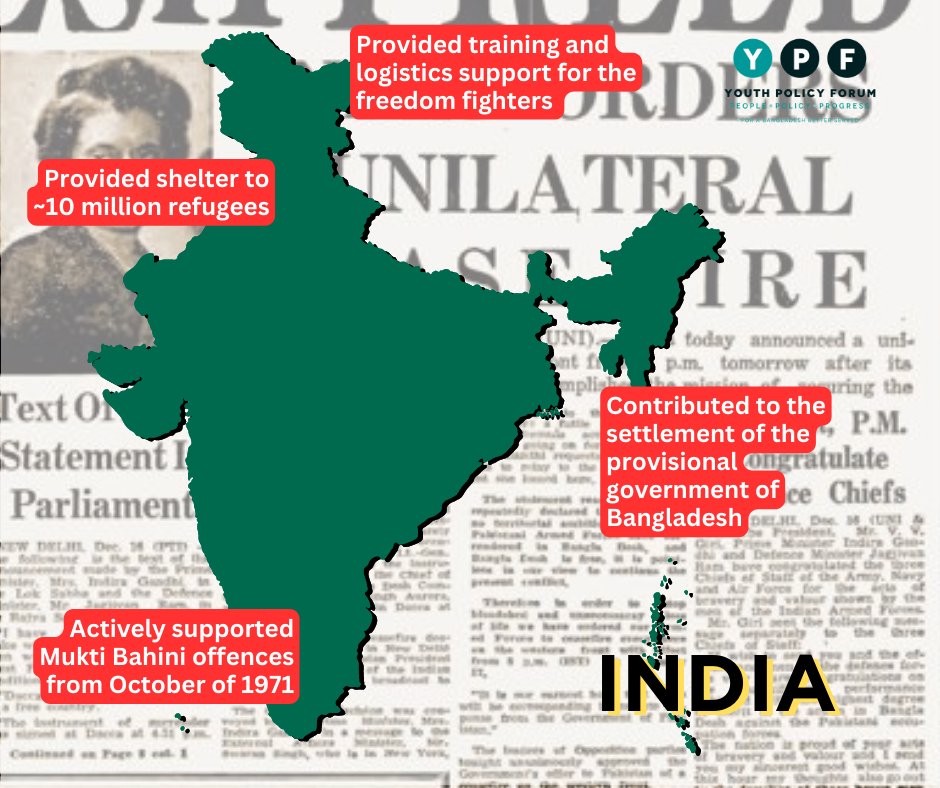
Indira Gandhi extended official assistance to take down military occupation in East Pakistan and provided shelter to ~10 million refugees who crossed the border. India contributed to the settlement of the provisional government of Bangladesh with Sheikh Mujibur Rahman as President and Tajuddin Ahmed as Prime Minister. During the nine months, it provided training and logistics support for the freedom fighters. From early October of 1971, India actively started supporting attacks by Mukti Bahini on Pakistani border posts. Indira Gandhi traveled across the world to mobilize support for Bangladesh and appealed to world leaders to intervene and pressure Pakistan to stop its brutalities in East Pakistan. India was second after Bhutan to give recognition to the Bangladesh Government on 6 December 1971 by a Parliament announcement. Calcutta was also the Capital-in-exile of the Mujibnagar Government, the provisional government of Bangladesh during the Liberation War.
India felt threatened as the United States kept supplying arms to Pakistan, ostensibly to “ward off communists.” Thus, despite being a non-aligned nation in the Cold War, India sought Soviet help with weaponry. But taking Soviet assistance, alongside holding a stance of non-alignment and criticizing America for the Vietnam War, put India in a bad light before the United States. Until mid-1971, India seemed to be left alone in supporting East Pakistan’s Liberation War. However, its amicable link with the USSR finally paid off through the historical Treaty of Peace, Friendship, and Cooperation. Although the treaty did not promise any all-out defense from hostile forces, it effectively served as a “deterrent warning to both China and Pakistan – its key rival in the region.”
United States
In 1954, Pakistan became a “double treaty ally” of the United States as it joined both the Central Treaty Organization and the Southeast Asia Treaty Organization — two military alliances during the Cold War with the aim of curbing the threat of communism in the Middle East and Southeast Asia.
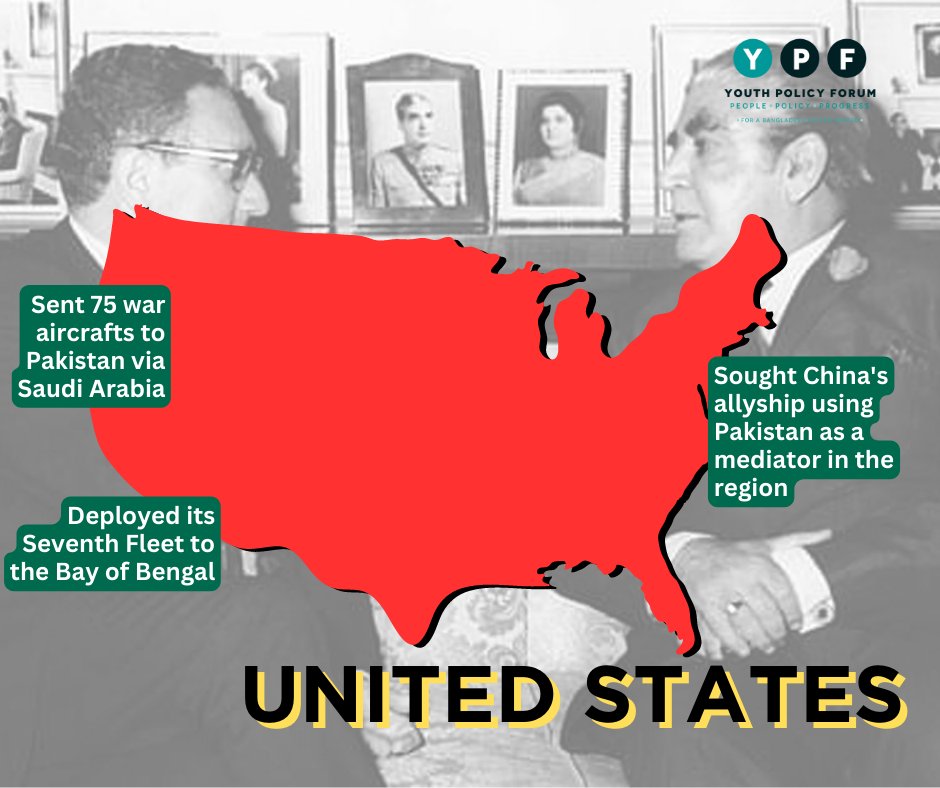
Beginning in the 1950’s, there was a deterioration of relations between the Soviet Union and China. This is commonly referred to as ‘The Sino-Soviet Split’. This split had occurred because the Soviet Union believed in a moderate and pragmatic approach to socialist revolution, whereas China advocated for a more militant and revolutionary path.
Following the split, the United States saw an opportunity to improve its relations with China as a means of weakening the USSR. Therefore, one of the Nixon administration’s foremost goals was to increase allyship between the US and China, which would isolate the USSR diplomatically. The US sought to seek that allyship using Pakistan as a mediator in the region, which meant that supporting West Pakistan was a part of its long term goals.
However, the US Senator Edward Moore Kennedy — who came to know about the refugee crisis brewing in India as well as the Pakistani army’s crackdown — strongly opposed the Nixon administration’s position. Although the Nixon administration maintained its stance, Kennedy remained persistent which resulted in a bill banning arms sales to Pakistan.
Despite such a bill, the administration moved forward with secretive efforts to help West Pakistan. During October of 1971, the United States sent 75 war aircrafts to Pakistan via Saudi Arabia. Iran and Jordan were also used as third parties by the US to send weapons to West Pakistan.
In December of that year, as it became increasingly apparent that Pakistan was losing control of East Bengal, the United States deployed its Seventh Fleet to the Bay of Bengal. Comprising around 40 ships, including aircraft carriers, destroyers, and other support vessels, the Seventh Fleet’s arrival was a significant development in the context of the war. The deployment of the Seventh Fleet was ostensibly intended as a show of support for Pakistan and a threat to the forces involved in the Liberation of Bangladesh.
The US state department was unaware of these secretive routes that Nixon used to send weapons to Pakistan. When this secret military aid to Pakistan was exposed in January 1972, it sparked outrage in US Congress and led to a series of investigations into the matter.
The Soviet Union (USSR)
The Soviet Union was another crucial supporter of Bangladesh during the Liberation War. The Bangladesh government approached the Soviet Union for assistance in the early stages of the Liberation War. They promptly sent military advisors, weapons, and ammunition to support the freedom fighters, and according to some estimates, provided up to $500 million in aid during the war. The USSR provided military support to both Bangladesh and India, which in turn aided the Mukti Bahini in their fight against Pakistan. Bangladesh was in direct contact with the Soviet Union, and the two countries established a direct air link to transport military supplies.
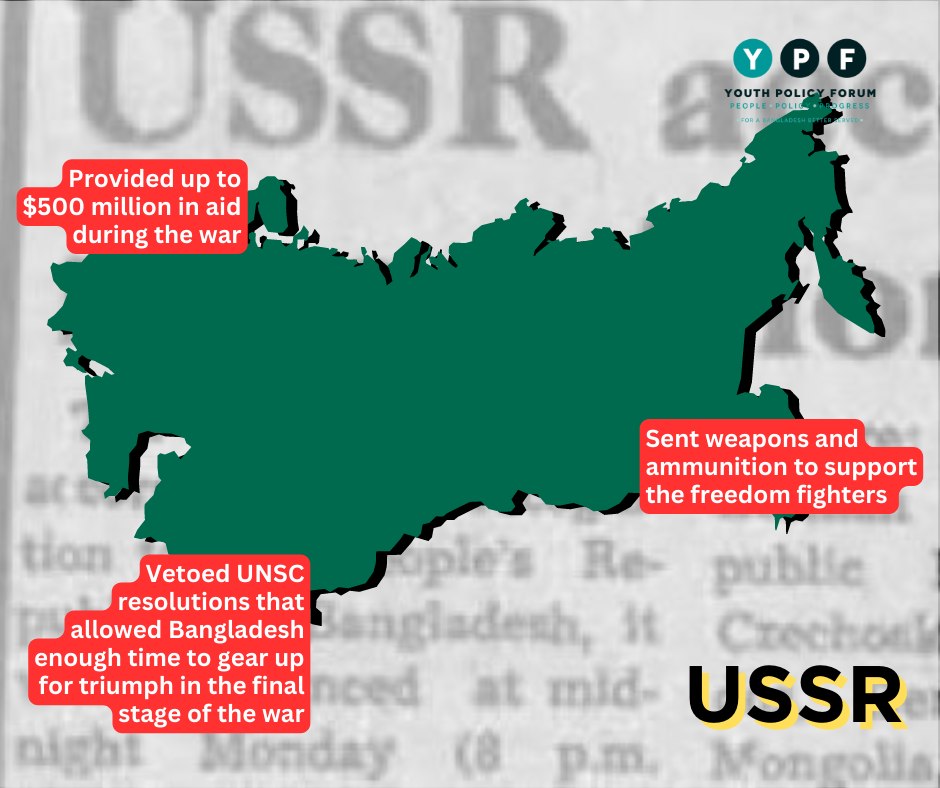
On the diplomatic front, the USSR rendered its support for Bangladesh by twice vetoing UN Security Council resolutions that called for an immediate ceasefire and withdrawal of troops. Vetoing the resolutions gave Bangladesh enough time to gear up for triumph in the final stage of the war.
The Soviet Union recognized Bangladesh as an independent nation on January 25, 1972. The Warsaw Pact countries were among the first to recognize Bangladesh as an independent nation. The Soviet Union’s support for Bangladesh significantly impacted the international community. It challenged the West’s dominance in international affairs and demonstrated the Soviet Union’s commitment to supporting national liberation movements. According to a quote by Henry Kissinger, “The Soviet Union had won a diplomatic victory of the first magnitude by championing the cause of the Bengali people.”
Other Soviet bloc countries, such as East Germany, Czechoslovakia, Poland and Hungary also supported Bangladesh with weapons, food, and medical supplies.
Cuba
During the Liberation War of Bangladesh, Cuba was one of the few countries in the Western Hemisphere to recognize and support Bangladesh’s independence.
On December 26, 1971, just two weeks after Bangladesh officially declared its independence, Cuba recognized the newly formed country. According to an article in The New York Times on December 28, 1971, the Cuban government stated that its recognition of Bangladesh was “a just action in support of the oppressed people of the world.”
Fidel Castro, made a public statement in support of Bangladesh’s independence during a speech on May 1, 1972. He referred to the struggle for Bangladesh’s independence as “a just war” and praised the “heroic resistance” of the Bengali people.
Middle East and North Africa
Given that the very basis of Pakistan was that it was a ‘Muslim homeland’ in South Asia, it was largely seen as legitimate by most Arab countries. This meant that after the initiation of Operation Searchlight, most Middle Eastern countries had, either implicitly or explicitly, sided with Pakistan.
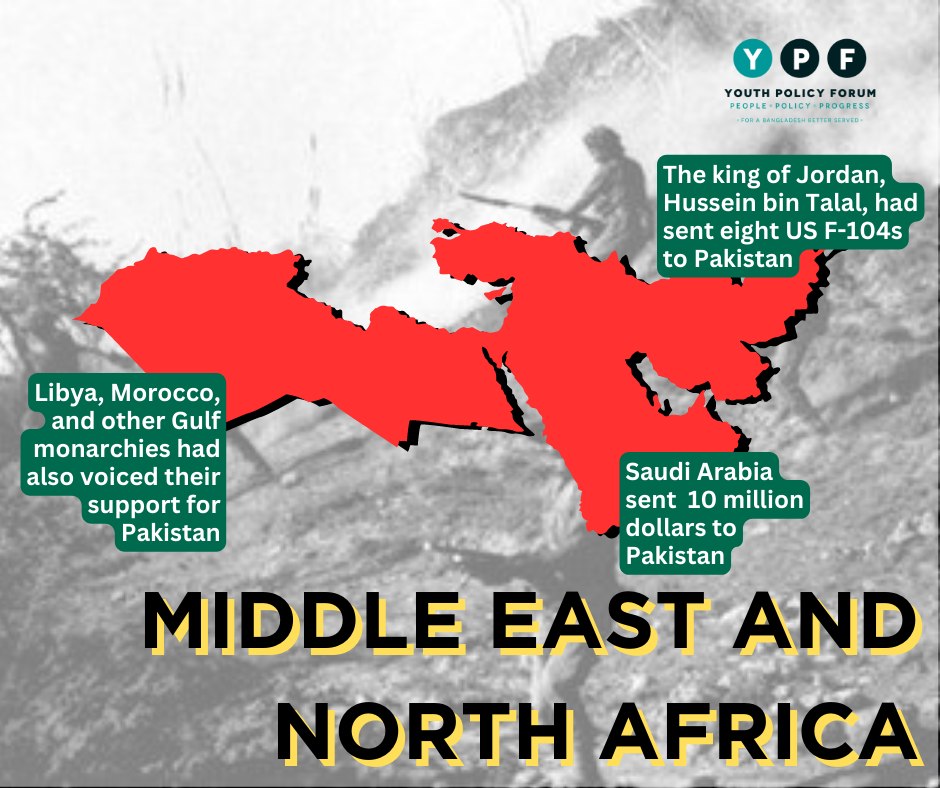
Saudi Arabia was one of the first countries to come to Pakistan’s aid. Since the US congress banned weapons aid to Pakistan, Richard Nixon had to use a secret route to send weapons to Pakistan, and Saudi Arabia was an integral part of this route. In October 1971, the US had sent 75 war aircrafts to Pakistan through Saudi Arabia.
Saudi Arabia was also quick to help Pakistan economically, as they had sent them 10 million dollars in cash by April. Other Arab countries, including Jordan, Libya, Morocco, and other Gulf monarchies, had also voiced their support for Pakistan.
The king of Jordan, Hussein bin Talal, had sent eight US F-104s to Pakistan while being backed by the US. During the war, Jordan’s High Commissioner in Pakistan had visited East Pakistan. He said that a strong and unified Pakistan was a source of strength not only to his country but to the whole Arab world, which was now fighting against their common enemy — Israel.
Israel was one of the few countries in the Middle East that had supported the Bangladeshi cause. On 21 July, the Israeli Parliament Had called on the world to act against the “bloodshed” and “persecution” of the “Bangladesh people” by Pakistan. It is likely that Israel’s status as the arch-enemy of the Arab world probably led them to support Bangladesh.
One might wonder how Bangladeshis, the largest Muslim population in the world after Arabs, got almost zero support from the Arab world. There are several reasons why Arab countries were so quick to back Pakistan.
One reason for their support of Pakistan was because the liberation movement was widely seen as a conspiracy of the Communist and Zionist bloc against the Arab world. The Arab leaders had believed that Islam was in danger in East Bengal as its people were getting close to a Hindu dominated India. Most of the Arab world had also bought Pakistan’s claims that the liberation movement was an Indian colonialist and imperialist conspiracy.
However, as time had passed, some Arab countries changed their opinions. For example: the Palestinian Liberation Organization, which was initially pro-Pakistan because their Arab allies were also pro-Pakistan. However, they completely reversed their position after their conflict with Jordan that lasted till July 1971. Yasser Arafat, the leader of the PLO, said that “The Palestinian commando organizations like Al Fattah and EPLP who are now locked in a grim battle in Jordan against Hussain’s troops that also include Pakistani soldiers have expressed their solidarity with the freedom fighters of Bangladesh.”
China
In the 1970s, US President Richard Nixon and his national security adviser, Henry Kissinger, used Pakistan as a backchannel to advance US communication with China. In fact, Kissinger’s first visit to China in 1971 was arranged with Pakistan as an intermediary. The goal was to distance China from the USSR, with whom it was already having an ideological conflict at that time. Thus, China’s support for Pakistan during the war was primarily motivated by its opposition to India and Soviet’s involvement in the conflict.

During the Bangladesh Liberation War and several years thereafter, China firmly supported Pakistan and remained hostile to Bangladesh. It saw the conflict as part of a broader struggle against Indian influence in the region, and viewed Pakistan as a key ally in this struggle. China supplied Pakistan with military aid, including weapons, ammunition, and training, and also provided diplomatic support by vetoing several United Nations resolutions that were detrimental to Pakistani war efforts. Even after the independence, from 1972-1974, China vetoed Bangladesh’s entry into the UN. Following Pakistan’s formal recognition of Bangladesh in 1974 and the military coup of 1975, China recognized Bangladesh as an independent nation in 1975 and established diplomatic ties.
Prepared by: Abrar Jawad, Jamie Tasnimur, Kayes Md Sayfullah, Ilman Mohtadin (Associates, YPF Foreign Policy Team) and Tabassum Elahi, Anannyo Samayel, Hrishik Roy (Leads, YPF Foreign PolicyTeam)
